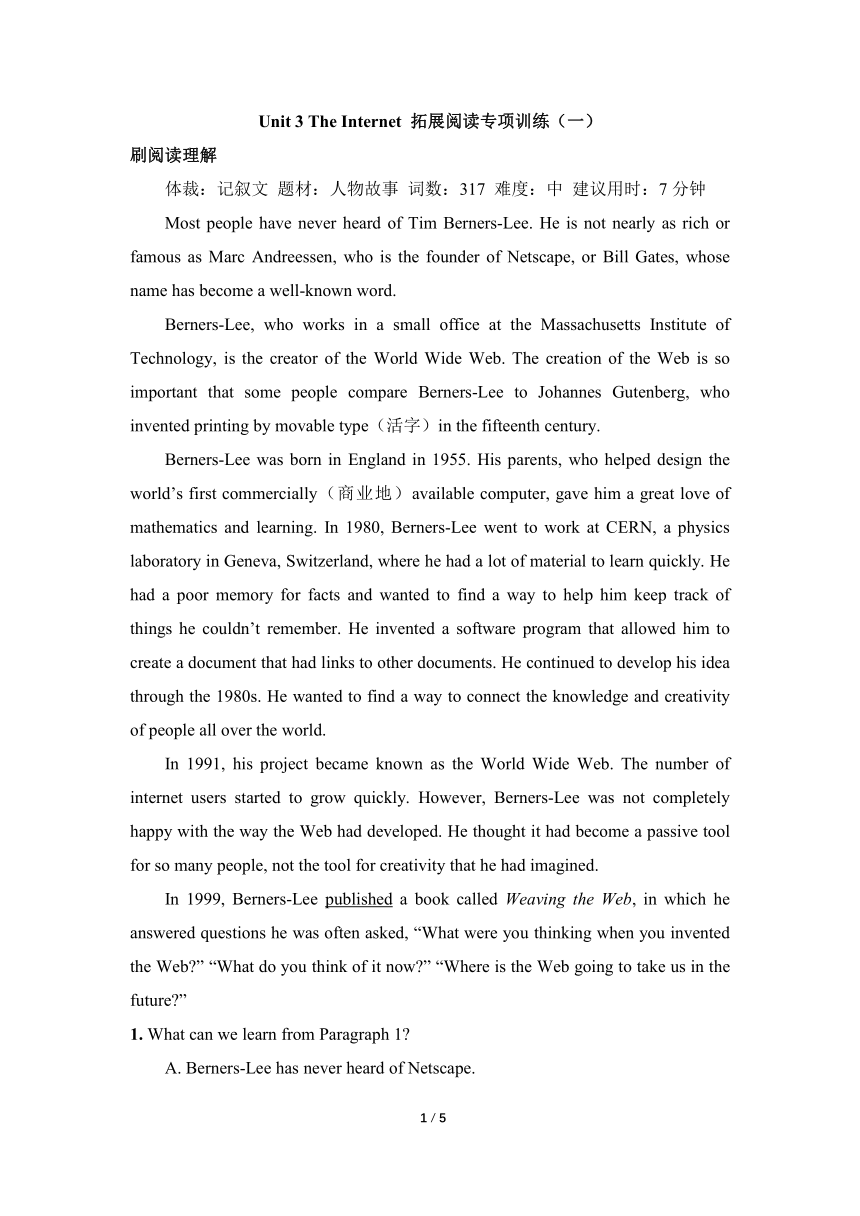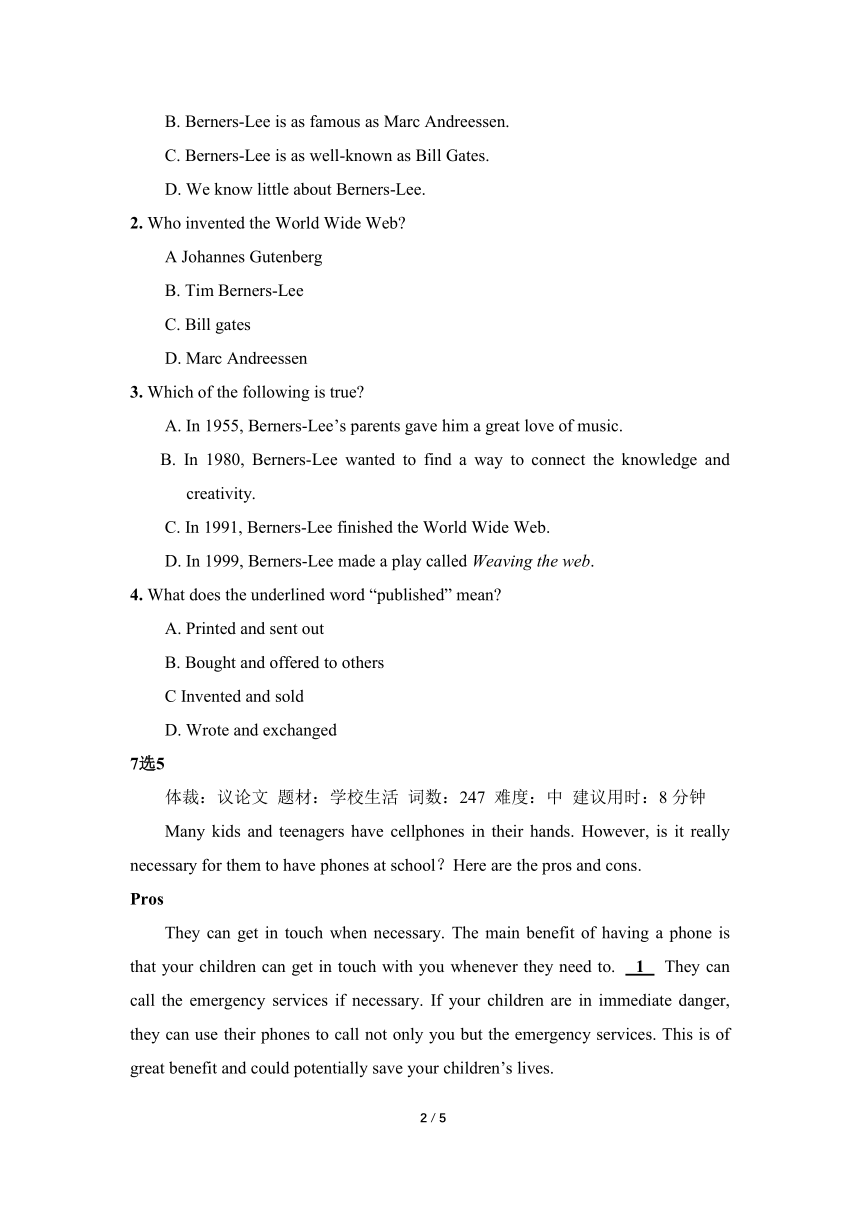人教版(2019) 必修第二册 Unit3 The internet拓展阅读专项训练(一)(含解析)
文档属性
| 名称 | 人教版(2019) 必修第二册 Unit3 The internet拓展阅读专项训练(一)(含解析) |

|
|
| 格式 | docx | ||
| 文件大小 | 18.7KB | ||
| 资源类型 | 教案 | ||
| 版本资源 | 人教版(2019) | ||
| 科目 | 英语 | ||
| 更新时间 | 2023-03-09 21:41:37 | ||
图片预览


文档简介
Unit 3 The Internet 拓展阅读专项训练(一)
刷阅读理解
体裁:记叙文 题材:人物故事 词数:317 难度:中 建议用时:7分钟
Most people have never heard of Tim Berners-Lee. He is not nearly as rich or famous as Marc Andreessen, who is the founder of Netscape, or Bill Gates, whose name has become a well-known word.
Berners-Lee, who works in a small office at the Massachusetts Institute of Technology, is the creator of the World Wide Web. The creation of the Web is so important that some people compare Berners-Lee to Johannes Gutenberg, who invented printing by movable type(活字)in the fifteenth century.
Berners-Lee was born in England in 1955. His parents, who helped design the world’s first commercially(商业地)available computer, gave him a great love of mathematics and learning. In 1980, Berners-Lee went to work at CERN, a physics laboratory in Geneva, Switzerland, where he had a lot of material to learn quickly. He had a poor memory for facts and wanted to find a way to help him keep track of things he couldn’t remember. He invented a software program that allowed him to create a document that had links to other documents. He continued to develop his idea through the 1980s. He wanted to find a way to connect the knowledge and creativity of people all over the world.
In 1991, his project became known as the World Wide Web. The number of internet users started to grow quickly. However, Berners-Lee was not completely happy with the way the Web had developed. He thought it had become a passive tool for so many people, not the tool for creativity that he had imagined.
In 1999, Berners-Lee published a book called Weaving the Web, in which he answered questions he was often asked, “What were you thinking when you invented the Web ” “What do you think of it now ” “Where is the Web going to take us in the future ”
1. What can we learn from Paragraph 1
A. Berners-Lee has never heard of Netscape.
B. Berners-Lee is as famous as Marc Andreessen.
C. Berners-Lee is as well-known as Bill Gates.
D. We know little about Berners-Lee.
2. Who invented the World Wide Web
A Johannes Gutenberg
B. Tim Berners-Lee
C. Bill gates
D. Marc Andreessen
3. Which of the following is true
A. In 1955, Berners-Lee’s parents gave him a great love of music.
B. In 1980, Berners-Lee wanted to find a way to connect the knowledge and creativity.
C. In 1991, Berners-Lee finished the World Wide Web.
D. In 1999, Berners-Lee made a play called Weaving the web.
4. What does the underlined word “published” mean
A. Printed and sent out
B. Bought and offered to others
C Invented and sold
D. Wrote and exchanged
7选5
体裁:议论文 题材:学校生活 词数:247 难度:中 建议用时:8分钟
Many kids and teenagers have cellphones in their hands. However, is it really necessary for them to have phones at school?Here are the pros and cons.
Pros
They can get in touch when necessary. The main benefit of having a phone is that your children can get in touch with you whenever they need to. 1 They can call the emergency services if necessary. If your children are in immediate danger, they can use their phones to call not only you but the emergency services. This is of great benefit and could potentially save your children’s lives.
2 As long as your children remember to do this, their phones won’t cause distraction(分心)in class. Giving them a standard instead of a smartphone will also reduce the risk of distraction.
Cons
The latest smartphones can almost double as a computer. It means they offer far more of a distraction to kids than they used to. 3 All these characteristics could disturb your children’s concentration(注意力)if they play with them in class.
Cellphones could interrupt lessons. Many children, even though they are asked to do so, forget to turn off their phones during lessons and their phones may make sounds. 4 Besides the distraction problem, cellphones can also be used to look up answers on the Internet. 5 The possibility of children having access to these during exams could be too attractive for them not to take advantage of.
Cellphones can be turned off or put on mute.
B Children use ordinary phones instead of smart-phones.
This allows you to feel they are safe and easy to reach.
Without cellphones, campus life would be less colourful.
They have some other functions-a calculator and the ability to save notes.
This not only annoys other pupils, but also prevents them from learning well.
Nowadays, children can not only text and make calls with their phones, but also play games, surf the Internet and listen to music.
答案解析
刷阅读理解
【语篇导读】本文为我们介绍了蒂姆·伯纳斯·李,他是万维网的创建者。
1. D 细节理解题。根据第一段可知,绝大多数人从未听说过蒂姆·伯纳斯·李。他远不如马克·安德森和比尔·盖茨那样富有和出名。
2. B 细节理解题。根据第二段第一句可知,蒂姆·伯纳斯·李是万维网的创建者。
3. C 细节理解题。根据倒数第二段第一句可知,在1991年,蒂姆·伯纳斯·李完成了万维网的创建。
4. A 词义猜测题。根据关键信息 a book called Weaving the Web可知,他在1999年出版了一本叫《编织万维网》的书。
长难句分析 He is not nearly as rich or famous as Marc Andreessen, who is the founder of Netscape, or Bill Gates, whose name has become a well-known word
句式分析:not nearly意为“根本不;远不及”; “as+adj./adv.+as+…”意为“和……一样……”。who is the founder of Netscape是非限制性定语从句,修饰 Marc Andreessen。whose name has become a well-known word也是非限制性定语从句,修饰 Bill gates。
句意:他远不及网景公司的创始人马克·安德森和名字已经众所的比尔·盖茨那样富有和出名。
刷7选5
【语篇导读】本文主要讨论了孩子带手机的优缺点。
1. C 空前讲孩子带手机可随时联系家人,空后讲孩子带手机在有困难时可急救,C项承上启下,故选C项。
2. A 该段讲的是避免上课分心的办法,设空处应是关上手机或调到静音,故选A项。
3. G 根据设空后的All these characteristics could disturb your children’s concentration…可知设空处应是手机的特点,正是这些特点让孩子分心,故选G项。
4. F 根据前一句中的 forget to turn off their phones during lessons and their phones may make sounds以及后一句中的 the distraction problem可知,设空处与 distraction有关。F项(这不仅打扰别的学生,还妨碍他们好好学习)符合语境。故选F项
5. E 根据下一句 The possibility of children having access to these during exams could be too attractive for them not to take advantage of.(孩子们在考试中能使用这些功能的可能性对他们来讲很有吸引力,想不利用都难)中的 these的含义,可推知选E项。
2 / 2
刷阅读理解
体裁:记叙文 题材:人物故事 词数:317 难度:中 建议用时:7分钟
Most people have never heard of Tim Berners-Lee. He is not nearly as rich or famous as Marc Andreessen, who is the founder of Netscape, or Bill Gates, whose name has become a well-known word.
Berners-Lee, who works in a small office at the Massachusetts Institute of Technology, is the creator of the World Wide Web. The creation of the Web is so important that some people compare Berners-Lee to Johannes Gutenberg, who invented printing by movable type(活字)in the fifteenth century.
Berners-Lee was born in England in 1955. His parents, who helped design the world’s first commercially(商业地)available computer, gave him a great love of mathematics and learning. In 1980, Berners-Lee went to work at CERN, a physics laboratory in Geneva, Switzerland, where he had a lot of material to learn quickly. He had a poor memory for facts and wanted to find a way to help him keep track of things he couldn’t remember. He invented a software program that allowed him to create a document that had links to other documents. He continued to develop his idea through the 1980s. He wanted to find a way to connect the knowledge and creativity of people all over the world.
In 1991, his project became known as the World Wide Web. The number of internet users started to grow quickly. However, Berners-Lee was not completely happy with the way the Web had developed. He thought it had become a passive tool for so many people, not the tool for creativity that he had imagined.
In 1999, Berners-Lee published a book called Weaving the Web, in which he answered questions he was often asked, “What were you thinking when you invented the Web ” “What do you think of it now ” “Where is the Web going to take us in the future ”
1. What can we learn from Paragraph 1
A. Berners-Lee has never heard of Netscape.
B. Berners-Lee is as famous as Marc Andreessen.
C. Berners-Lee is as well-known as Bill Gates.
D. We know little about Berners-Lee.
2. Who invented the World Wide Web
A Johannes Gutenberg
B. Tim Berners-Lee
C. Bill gates
D. Marc Andreessen
3. Which of the following is true
A. In 1955, Berners-Lee’s parents gave him a great love of music.
B. In 1980, Berners-Lee wanted to find a way to connect the knowledge and creativity.
C. In 1991, Berners-Lee finished the World Wide Web.
D. In 1999, Berners-Lee made a play called Weaving the web.
4. What does the underlined word “published” mean
A. Printed and sent out
B. Bought and offered to others
C Invented and sold
D. Wrote and exchanged
7选5
体裁:议论文 题材:学校生活 词数:247 难度:中 建议用时:8分钟
Many kids and teenagers have cellphones in their hands. However, is it really necessary for them to have phones at school?Here are the pros and cons.
Pros
They can get in touch when necessary. The main benefit of having a phone is that your children can get in touch with you whenever they need to. 1 They can call the emergency services if necessary. If your children are in immediate danger, they can use their phones to call not only you but the emergency services. This is of great benefit and could potentially save your children’s lives.
2 As long as your children remember to do this, their phones won’t cause distraction(分心)in class. Giving them a standard instead of a smartphone will also reduce the risk of distraction.
Cons
The latest smartphones can almost double as a computer. It means they offer far more of a distraction to kids than they used to. 3 All these characteristics could disturb your children’s concentration(注意力)if they play with them in class.
Cellphones could interrupt lessons. Many children, even though they are asked to do so, forget to turn off their phones during lessons and their phones may make sounds. 4 Besides the distraction problem, cellphones can also be used to look up answers on the Internet. 5 The possibility of children having access to these during exams could be too attractive for them not to take advantage of.
Cellphones can be turned off or put on mute.
B Children use ordinary phones instead of smart-phones.
This allows you to feel they are safe and easy to reach.
Without cellphones, campus life would be less colourful.
They have some other functions-a calculator and the ability to save notes.
This not only annoys other pupils, but also prevents them from learning well.
Nowadays, children can not only text and make calls with their phones, but also play games, surf the Internet and listen to music.
答案解析
刷阅读理解
【语篇导读】本文为我们介绍了蒂姆·伯纳斯·李,他是万维网的创建者。
1. D 细节理解题。根据第一段可知,绝大多数人从未听说过蒂姆·伯纳斯·李。他远不如马克·安德森和比尔·盖茨那样富有和出名。
2. B 细节理解题。根据第二段第一句可知,蒂姆·伯纳斯·李是万维网的创建者。
3. C 细节理解题。根据倒数第二段第一句可知,在1991年,蒂姆·伯纳斯·李完成了万维网的创建。
4. A 词义猜测题。根据关键信息 a book called Weaving the Web可知,他在1999年出版了一本叫《编织万维网》的书。
长难句分析 He is not nearly as rich or famous as Marc Andreessen, who is the founder of Netscape, or Bill Gates, whose name has become a well-known word
句式分析:not nearly意为“根本不;远不及”; “as+adj./adv.+as+…”意为“和……一样……”。who is the founder of Netscape是非限制性定语从句,修饰 Marc Andreessen。whose name has become a well-known word也是非限制性定语从句,修饰 Bill gates。
句意:他远不及网景公司的创始人马克·安德森和名字已经众所的比尔·盖茨那样富有和出名。
刷7选5
【语篇导读】本文主要讨论了孩子带手机的优缺点。
1. C 空前讲孩子带手机可随时联系家人,空后讲孩子带手机在有困难时可急救,C项承上启下,故选C项。
2. A 该段讲的是避免上课分心的办法,设空处应是关上手机或调到静音,故选A项。
3. G 根据设空后的All these characteristics could disturb your children’s concentration…可知设空处应是手机的特点,正是这些特点让孩子分心,故选G项。
4. F 根据前一句中的 forget to turn off their phones during lessons and their phones may make sounds以及后一句中的 the distraction problem可知,设空处与 distraction有关。F项(这不仅打扰别的学生,还妨碍他们好好学习)符合语境。故选F项
5. E 根据下一句 The possibility of children having access to these during exams could be too attractive for them not to take advantage of.(孩子们在考试中能使用这些功能的可能性对他们来讲很有吸引力,想不利用都难)中的 these的含义,可推知选E项。
2 / 2
